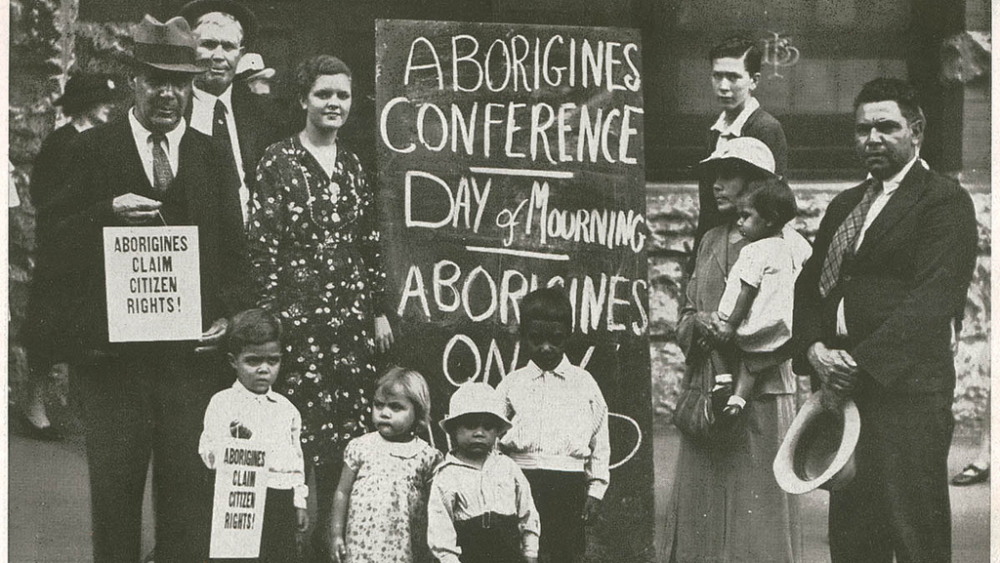Aboriginal groups are calling on churches to take time to reflect on our nation’s history on the Sunday before Australia Day. Holding events on the Sunday prior to the controversial day means churches can reach out to First Australians without needing to take a stance on the “change the date” debate.
However, next year (2020) Australia Day – January 26 – will fall on a Sunday.
These services are a beautiful opportunity for us to stand with our Aboriginal and Torres Strait Islander sisters and brothers, while learning more about the true history of January 26th — Common Grace
Social justice movement Common Grace is backing a campaign by Aunty Jean Phillips – a senior Aboriginal Christian leader – who is inviting Australians to attend prayer services in the lead-up to January 26th. Aunty Jean started these services seven years ago and they have been held nationally for the past four years with Common Grace’s support. This year, seventeen services are scheduled across Australia, hosted by Baptist, Uniting Church, Anglican, Salvation Army and independent churches, with one to take place at Fisherman’s Beach on the Mornington Peninsula.
“These services are a beautiful opportunity for us to stand with our Aboriginal and Torres Strait Islander sisters and brothers, while learning more about the true history of January 26th,” Common Grace explains on its website.
Common Grace is also asking for churches to set aside 15 minutes in their service on Sunday January 20 for commemoration – asking congregations to “reclaim William Cooper’s Aboriginal Sunday” – a date Aboriginal Christian leader Cooper established in 1938 as a day of Christian solidarity, calling for full citizenship rights to be granted to Aboriginal peoples.
The UCA service begins with an acknowledgment or welcome to country and then this greeting: “Today friends, we are remembering the tragic history of our nation and the violent dispossession of her First Peoples. Today is a Day of Mourning.
At the request of the Uniting Aboriginal and Islander Christian Congress (UAICC), the Uniting Church in Australia (UCA) has declared Sunday January 20 to be the denomination’s first official ‘Day of Mourning’ and is asking Uniting Church congregations across the country to hold worship services that reflect on the effect of invasion and colonisation on Australia’s First Peoples.
“We encourage you to join with other Uniting Church members in lamenting, saying sorry and asking for forgiveness, for the past and current impacts of colonisation and dispossession of Australia’s First Peoples,” says the resource page on their website. “In the spirit of our Covenant relationship with the UAICC, we have declared the Sunday before Australia Day as a Day of Mourning,” the UCA President Deirdre Palmer says in an introduction to the worship resource. …”This worship service will be an annual fixture on our liturgical calendar.”
The UCA service begins with an acknowledgment or welcome to country and then this greeting: “Today friends, we are remembering the tragic history of our nation and the violent dispossession of her First Peoples. Today is a Day of Mourning. Today we mark in lament the truth of our shared history and we lift up to God our prayers for First Peoples and our nation. We say sorry and we pray for forgiveness, healing and hope. But today is also a day of worship. So we come together and give thanks to God for the abundant grace and liberating hope which we know through Jesus Christ and which is for all people.”
A “Day of Mourning” on or near January 26 is not a new idea. On January 26, 1938, while the state premiers celebrated sesquicentenary celebrations in Sydney, a group of Aboriginal leaders including William Cooper gathered for a Day of Mourning to protest their mistreatment by white Australians and to call for full citizenship rights.
At that time, the celebration was a NSW anniversary, which had become known as “Foundation Day” or “Anniversary” when state leaders and New Zealand leaders gathered in Sydney to celebrate the centenary of British occupation in 1888. Previously, it had been an informal Sydney celebration which was formalised as a public holiday by Governor Macquarie on the 30th anniversary in 1818.
Cooper’s Day of Morning was held before Australia Day until, as with NAIDOC week, until it was shifted to July during the 1950s. After the Bicentennial Australia Day in 1988, Aboriginal protests such as Survival Day concerts once again focused around the January date.
The UCA and Common Grace initiatives will form part of a continuing process of Australia’s first and second peoples processing their common history, with churches playing their part.


